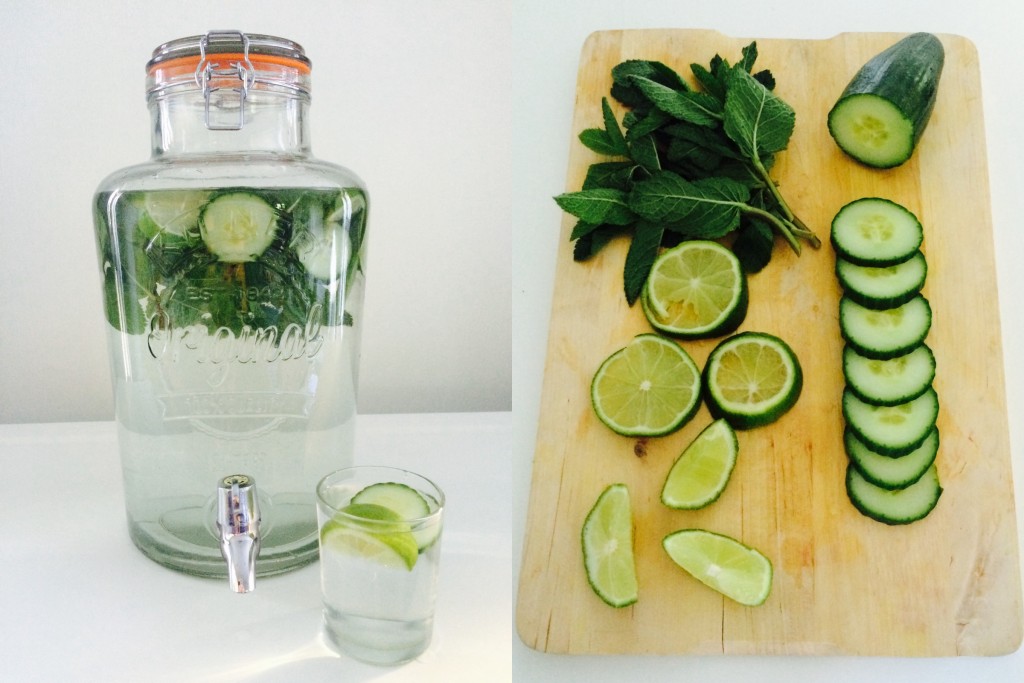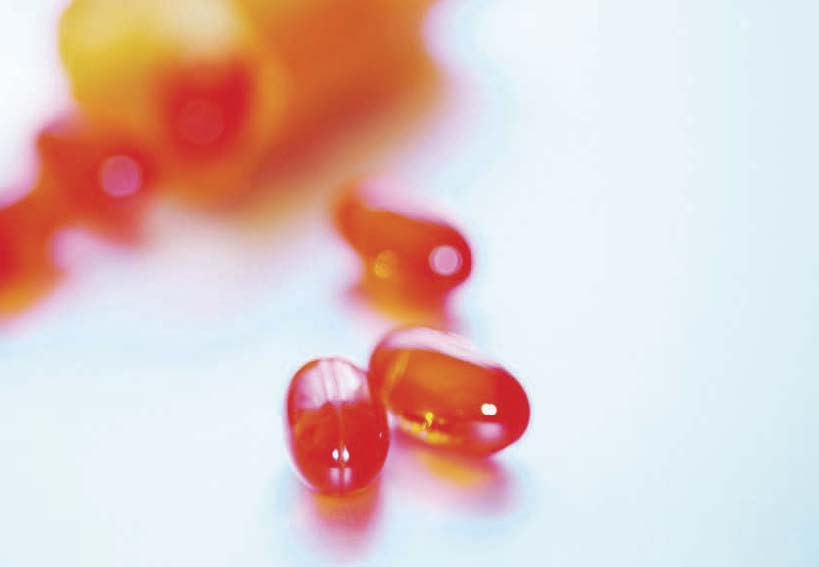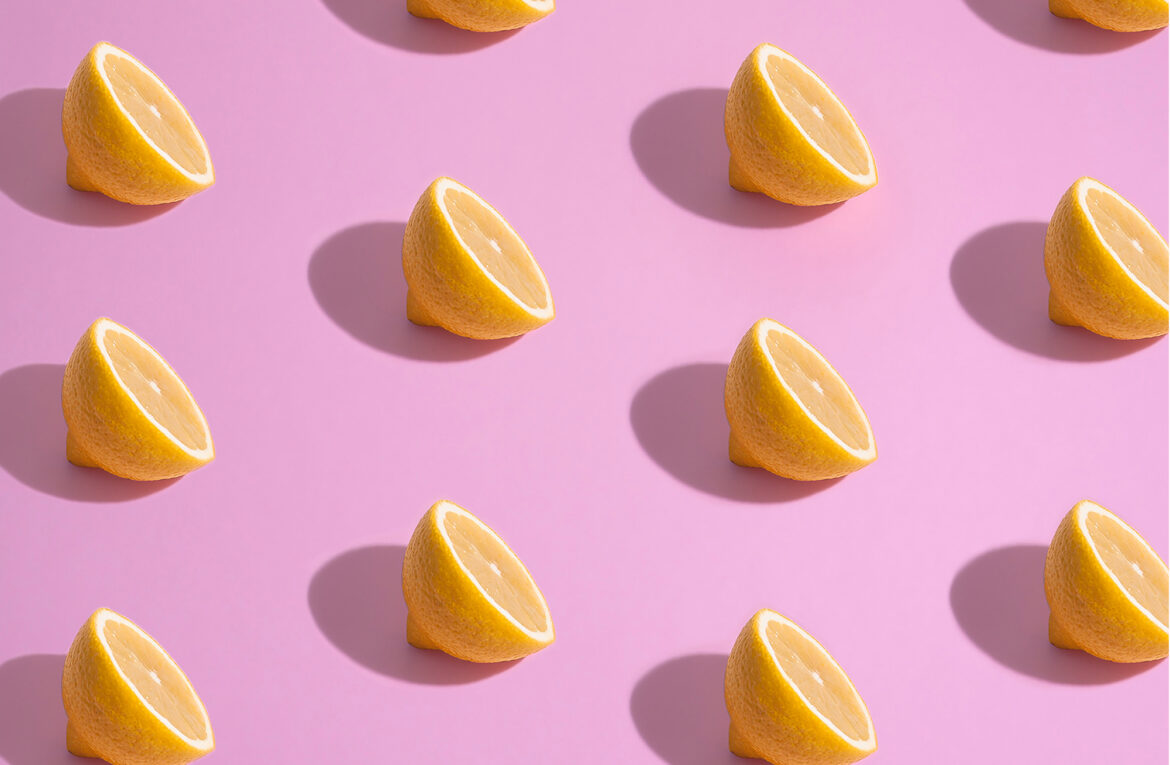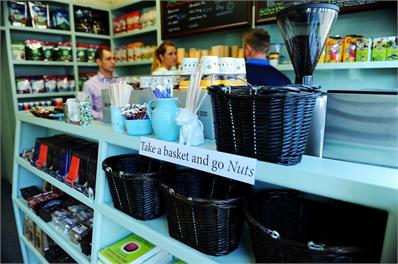Our Winter 2021/22 issue has gone to print. In this issue Hans Wieland shares how we can learn from lemons– dive on in for a sneak peek!
natural

Reboot yourself for the new year.
From our Winter 2015/2016 issue.
By Maria Donlon
Winter is a great time of year for a reboot, whether it’s to offset the Christmas indulgence or to boost immunity in the middle of the coldest months. The good news is that our bodies are naturally designed to detoxify themselves every single day. So what is the purpose of all of this detoxing? The body is working hard all the time to maintain the delicate balance between acid and alkaline, the PH level. We can assist this natural process with some simple actions.
Hydration: We should all be getting a minimum of 2 litres of fluids per day. Add fresh lime wedges to your drinking water for flavour and to help raise that delicate PH balance.
Sleep: The deepest cleansing cycle occurs while we are sleeping so it’s really important to be getting 6-8 hours of restful sleep every night. If you have trouble falling asleep make sure to turn off your mobile phone, try some simple breathing exercises and avoid eating for 2 hours before going to bed.
Start the day with warm water with fresh lemon and a pinch of cayenne pepper. This helps to flush out toxins built up overnight, kickstarts the digestive system and gets our blood flowing.
Go green: Adding green vegetables to the diet is one of the quickest ways to help alkalise the body. Try adding green vegetable juices to your daily diet for a readily absorbable supply of alkalising nutrients.
Sleep Easy

Each year a growing number of people suffer from insomnia. The quality of sleep is closely related to how people think, act and feel and as sleeping five hours or less per night increases our mortality rate from diseases and accidents by 15%, it means it’s top of the list for priorities.
Eliminating or even reducing sleep problems will improve both health and wellbeing but let’s take the pressure, off, lie back, relax and read. One GP, Dr Roderick Fahey, who often advises people on this area, shared what he’s seen help his patients.
‘There are many different types of sleep aids for insomnia, including non prescription and prescription medications. However, as a doctor, I will always try to take an holistic and natural approach to reaching a solution due to side effects or short effectiveness of sleeping tablets which are only designed to help bridge the gap for a few weeks. I look to the common factors that play a role in most sleep disturbances. Understanding these factors can help person overcome a sleep problem. These include a Wellsense Insomnia Assessment which seeks to first understand what could be causing sleep difficulties.
Broadly speaking I assess the following areas: medical, lifestyle, diet, sleep environment, anxiety and depression.
I encourage my patients to keep a Daily Sleep Diary and introduce my 10 rules for improved sleep hygiene. Following my assessment I am in a position to personalise a treatment plan. Normally, I recommend music as a first stage such as The Alphamusic of John Levine. I receive excellent feedback with positive results after treatment with this particular music. In summing up, I believe following a prescribed plan to bring back restorative sleep should work best for insomnia sufferers.”
Dr Roderick Fahey’s opinion does not stand alone. There are more and more doctors and other clinical practitioners who switch to natural methods when trying to cure patients’ symptoms such as depression, stress or insomnia.
Using relaxation techniques to ease the stress of dental anxiety is one of dentist Dr Nader Malik’s fundamental principles when treating each of his patients. Being concerned about the possible negative side effects of dental sedation on both his patients and staff, Dr Malik has incorporated natural drug-free methods such as Levine’s music with exceptional results! Even high security dementia wards in Australia and nursing homes in the UK, Ireland and USA are now using alpha relaxation techniques to manage dementia patients and help them stay calm by reducing their agitated state.
Fertile Ground – Natural ways to increase your fertility, Michelle Magill
Fertility isn’t all age related. Many 40yr olds can conceive successfully. Research is being conducted in Toronto to show that the eggs of older women can perhaps be rejuvenated with COQ10. Superfoods such as wheatgrass, Spirulina, and COQ10 are vital to the production of high quality eggs. A customized prescription of Chinese herbs from an herbal pharmacy may also help.
If you do find yourself having fertility problems, check there is nothing going on structurally, e.g. blockages or infection. Then look at the cycle length, ovulation and bleed quality. Eggs go through a 90-120 days maturation phase (4 months). During that period, your lifestyle is key to the results of those eggs, whether seeking natural pregnancy or IVF.
Treatments like Acupuncture and Femoral Massage increase blood flow to pelvic organs and provide nourishment to the uterus and ovaries. This will bring about a higher success rate.
The fertility clinic at Melt Natural Healing Centre is a Chinese Medicine clinic. We assist couples diagnosed with unexplained fertility problems by designing a comprehensive therapeutic program through traditional Chinese Medicine that supports their reproductive journey. We also use reflexology, lymph drainage and herbalism in our treatments to assist with your acupuncture program.
There’s a new Health & Beauty store in Glasthule Village, co. Dublin run by two enthusiastic health nuts, James Norton and Darragh Buckley.
Home to Health Food, Supplements, Organic & Natural Beauty Products, Organic Fruit and Vegetables, Organic Coffee, Juices & Smoothies.
Check them out online at www.thepunnethealthstore.com
 by Isabel O’Brien
by Isabel O’Brien
A mineral makeup that is completely natural and pure, easy to use and travel with, while offering truly light, but reliable coverage.
MyChelle is the first cosmetics company to create a mineral makeup in a solid stick formula. MyChelle Minerals™ offers a solutions-oriented approach to existing mineral makeup choices and enables a more even coverage, while leaving a matte finish without the drying normally associated with powder mineral makeup. What’s more, MyChelle Minerals’ unique applicator withstands the rigors of everyday travel. This easy-to-use stick is completely new to the mineral makeup revolution. It will change the perception of what mineral makeup is and make it even more versatile in concept.
The mineral makeup is created without using water, which keeps them clean and free of bacteria. This new technique allows MyChelle to be free of chemical preservatives typically found in conventional makeup. Yet, the shelf life is 2 years, just like any other product. Furthermore, MyChelle uses only natural ingredients, which are ideal for those with sensitive skin and acne.
The flagship product leading the Minerals line is the Cream Foundation, with a sheer matte coverage for a beautiful, natural finish. This foundation brightens complexion, evens skin tone and diminishes the appearance of fine lines due to the light reflecting qualities of micas and silica. Silica controls sebum production so the skin feels smooth, not oily. The Cream Foundation naturally refines the skin’s appearance for a beautiful, polished, finished look that is light and fresh and resists fading.
Designed to complement the Cream Foundation, the Concealer offers superior coverage that blends easily to erase dark circles, blemishes and uneven pigmentation.
The moisturizing Blush Stick leaves a rich, natural glow with a powdery, matte finish.
The Eye Shimmer provides subtle, enhancing colour to the eye area. The crayon-style applicator allows you to apply a single colour or to mix shades for your own unique look.
Little Kisses performs like the classic lip stick, but contain a healthy food grade base, with a beautiful glide, luscious lip feel and rich, warm tones that complement every skin tone.
MyChelle Minerals Lip Gloss is a moisturizing, plumping lip gloss designed to be worn alone or layered over Little Kisses. Lip Gloss is formulated from a European peptide complex that has been clinically proven to increase the lip’s volume and decrease furrows around the lips by 40% over the course of 30 days. These glosses use all natural ingredients with none of the chemicals or petroleum adhesives commonly found even in so-called “natural” lip gloss.
The following are key ingredients in the MyChelle Minerals™ collection:
Camellia Oleifera Seed Oil: antioxidant and skin brightener – a deeply penetrating light oil which gives skin a beautiful texture and glow; helps reduce the appearance of wrinkles, spots, freckles and acne.
Silica: helps reduce the appearance of fine lines and wrinkles, and controls sebum for a smooth matte finish.
Vitis Vinifera (Grape) Seed Oil: quickly penetrates the skin; powerful antioxidant; rich in flavonoids; inhibits allergic reactions; protects the skin’s own collagen, elastin and hyaluronic acid.
Brassica Campestris/Aleurites Fordii Oil Copolymer: two vegetable oils flash heated in a vacuum to create a copolymer that gives natural shine and body without chemicals or petroleum derived ingredients.
Castor Isostearate Beeswax Succinate: Eco-cert ingredient; a castor oil derived copolymer that moisturizes and increases wear time.
MAXI-LIP ™: lip plumping peptide clinically proven to increase lip volume up to 40% of what you may have lost due to aging, and reduce fine lines around lips over the course of 30 days use.
Lauroyl Lysine: a molasses derived amino acid that promotes lip health and has been shown to fight cold sores.
MyChelle Minerals is designed to be used in combination with MyChelle’s skincare products as a system.
MyChelle Dermaceuticals offers a full line of cleansers, serum treatments, toners, nourishing creams, sun protection, intensive treatments, mineral makeup and a line of men’s products. Each product is formulated with superior ingredients with the chirally correct molecular structures to ensure proper absorption and effectiveness. All MyChelle formulas are free of artificial colouring agents, parabens and fragrances. MyChelle promotes the idea of safer natural products for the natural products industry, while at the same time, the company works to educate the public on the dangers of the overuse of oestrogens in today’s skincare products.
The complete MyChelle line can be found at www.skinassure.com and selected health stores and spas. Customer Service: 0404 49840
by Robert Verkerk
 I am fascinated by the different ways people choose to manage their physical health. Some seem content to treat their bodies rather like a rent-a-wreck hire car, handing it over to the men and women in white coats once they run into difficulties—usually sometime in their fifties. This dependency continues until the vehicle is ready to be recycled.
I am fascinated by the different ways people choose to manage their physical health. Some seem content to treat their bodies rather like a rent-a-wreck hire car, handing it over to the men and women in white coats once they run into difficulties—usually sometime in their fifties. This dependency continues until the vehicle is ready to be recycled.
Others can’t conceive of letting anything other than organic, macrobiotic raw foods pass their lips, whilst never indulging in common vices like alcohol. City streets are no-go zones given the fumes. Yet others choose to follow the path of one of the ancient non-European systems of healthcare, such as Ayurveda or Traditional Chinese Medicine. Many of us sit somewhere in-between.
How reliant are you on your GP?
My fascination is such that I frequently ask my audiences how many have seen a GP in the last 12 months. Within natural health-aware circles, it’s unusual to get more than a very small show of hands. Often no one raises a hand. At a recent London trade show only one person responded—and that lady was wheelchair bound.
Those of us who choose to self-manage our health—or, if the need arises, see a practitioner of one or other natural medicine modality—are effectively moving through uncharted waters. Governments and the medical profession have no studies to prove whether we are more, or less, healthy than our counterparts who’ve handed responsibility to pill-pushing GPs and their medical colleagues. However, they might realize, from the copious anecdotal evidence available, that the majority of us who have chosen to use natural healthcare appear to enjoy a greater level of health than those reliant primarily on drugs or surgery.
Most importantly, they know that, despite regular attacks mounted against natural medicine by the orthodoxy and sceptics alike (and fuelled by well-oiled PR machines and a receptive media), we are not altering the way we manage our health. In fact, natural health and complementary medicine continue to grow. The pharmaceutical industry, in stark contrast, is struggling in the wake of increasing public recognition of the limited effectiveness, high cost and unacceptable side effects of many drugs.
Tightening the noose on natural medicine
One of the greatest threats to natural medicine is the complex regulatory regime emerging from Brussels. It comes in the form of a clutch of EU Directives and Regulations targeted at natural health products, like food supplements and traditional herbal medicines. The regulations also aim to limit what can be said (literally!) or written on product labels, websites or any other commercial presentation to what is agreed by the highest ‘authority’ on food in Europe, the Parma-based European Food Safety Authority.
One complication is that there are many pieces of legislation to keep your eye on, whilst the main chance to lobby on these is whilst the laws are in the proposal phase. It’s also hard to convince people of the real threats posed when the spin- machine working on the other side is so well funded.
Worse than this, once a piece of law comes into force it generally has very little effect as there is a slow phase-in period. In fact many of the laws have transitional phases in which some provisions are not brought in for 4, 7 or—as in the case of the ban on implied health claims on brand names in the EU’s Nutrition and Health Claims Regulation of 2007—more than 14 years. This delayed impact is actually quite insidious, particularly as any legal challenge by judicial review (such as that conducted by my organisation, the Alliance for Natural Health, between 2003 and 2005) must be initiated within 3 months of a given EU law coming into force. In political terms, the slow boil of European laws on natural health is called ‘gradualism’; it helps everyone to adjust to each new, incremental level of restriction.
What’s in the pipeline?
This article is no place to bore you with the details. You can look at our website at www.anhcampaign.org if you would like to educate yourself on this subject. But I think it’s worth pointing out a few of the many timelines, known or estimated, that we’re up against:
January 2009: expected publication by the European Commission of its plans to limit maximum daily dosages of vitamins and minerals in food supplements. Early indications suggest these levels will be considerably lower than those typically present today in Ireland, the UK and other more liberal EU Member States. Germany, for example, is pushing for maximum daily levels of beta-carotene equivalent to that which you’d find in just half a large carrot, whilst it wants selenium levels no higher than those found in one-third of a brazil nut. It might take another year or two for these proposals to make it into law and there is everything to play for right now
1 January 2010: an EU-wide ban on any food supplement containing a vitamin or mineral, or form of vitamin or mineral, that is not on the European Commission’s ‘positive list’. Fortunately, we’ve already managed to secure natural sources of vitamins and minerals outside the scope of this Directive, they now being subject to the same General Food Law that governs the safety of a loaf of bread
2010 (date yet to be set firmly): all health claims about foods or natural health products and supplements, to be banned unless specifically approved by the European Commission and the European Food Safety Authority. This includes using published scientific references to support claims, unless they have been approved—which is in itself an arduous and expensive process requiring unequivocal evidence from multiple human studies
31 March 2011: the date that the transition phase of the Traditional Herbal Medicinal Products Directive (THMPD) expires. Depending on what happens between now and this date, many EU Member States might use it as a time to ban many herbal products currently used in food supplements, on the basis that their only acceptable usage is as licensed herbal medicines under the simplified drug authorisation scheme offered by the THMPD. They seem relatively unconcerned that the provisions of the Directive, as they currently stand, simply exclude, from a technical standpoint, a huge array of products associated with great traditions such as Ayurveda, Unani, Traditional Chinese Medicine, Tibetan and Amazonian herbal medicine, to name but a few.
The global Codex agenda
The EU, with its population now exceeding half a billion people, is one of the key drivers in global guidelines and standards on food. This is partially because the heart of both the World Health Organization (WHO), in Geneva, and the Food and Agricultural Organization (FAO), in Rome, are both in the ‘Euro zone’ (in the non-monetary sense). It’s also because Germany, with one of the most restrictive domestic legislatures on natural health and food supplements, has for decades headed up the key committee on nutrition in the inter-governmental organisation responsible for global guidelines and standards on food, the Codex Alimentarius Commission, itself a progeny of the WHO and FAO.
So, where do we go from here?
The new paradigm: sustainable healthcare
No amount of legislation, I believe, will stop people from accessing nature to help support the countless self-healing systems that abound in our bodies. Even the politicians realise this. And that’s when you start to appreciate that the primary driver of the ever-increasing raft of legislation affecting natural health is much more about cornering trade than it is about protecting consumer health, the latter being the oft-repeated claim of over- zealous regulators. Internet sales and black markets may be the last-stop café, but as Roosevelt and others recognised during ‘the prohibition’ (of alcohol) in the 1920s in the USA, it’s very difficult to stop people doing what they really want. When it comes to natural health, people feel very strongly.
In fact, in 1994, more Americans demonstrated against the planned ‘medicalisation’ of dietary (food) supplements than on any other issue in US history. While the composition of our diets gradually deteriorates, no thanks to the efforts of Big Agri and Big Food, many people have a strong urge to make up for the losses by ingesting concentrated nutrients. My belief is that this unshakeable and increasing interest that humans as a species have in consuming concentrated sources of nutrients, in the form of food supplements, is actually an evolutionary adaptation to the dietary simplification that abounds in both the industrialised and non-industrialised world.
This dietary simplification is the central plank to the five major chronic diseases, namely cancer, cardiovascular disease, diabetes, obesity and osteoporosis, that now provide by far the largest burden on healthcare systems around the world. Drugs and surgery have done very little to offset these diseases. The World Health Organization, one of the most authoritative bodies in healthcare, in recognition of this, have established the Global Strategy on Diet, Physical Activity and Health (see www.who.int/dietphysicalactivity/en) which promotes diet, nutrition and physical activity as the key means of combating these chronic diseases. Ironically, these approaches are the primary domain of Complementary & Alternative Medicine (CAM), and tend to be ignored or viewed as peripheral in orthodox medicine.
Industry, politicians and the general public have begun to understand that nature is central to any sustainable approach, be it in agriculture, forestry, energy or tourism. All we need to do now is help them to appreciate that the same goes for healthcare. To find out more about the Alliance for Natural Health’s sustainable healthcare initiative, go to: www.anhcampaign.org/campaigns/sustainable-healthcare








![spring-2009_pl_web_page_28_image_0001[1]](https://www.positivelife.ie/dev/wp-content/uploads/2009/06/spring-2009_pl_web_page_28_image_00011.jpg)
![pl_full_web_page_41_image_0001[1]](https://www.positivelife.ie/dev/wp-content/uploads/2009/03/pl_full_web_page_41_image_00011.jpg)